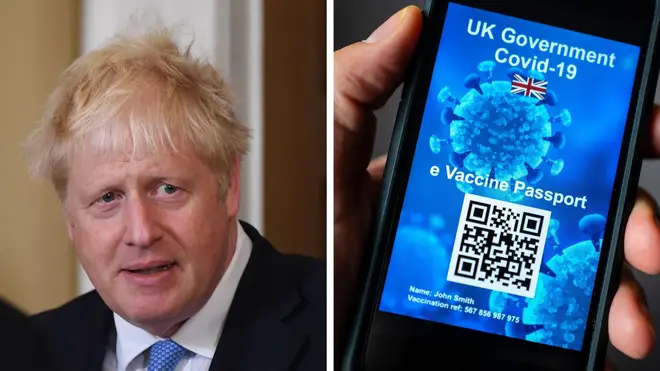
Paul Brand 10am - 12pm
12 September 2021, 10:17 | Updated: 13 September 2021, 06:59

Vaccine passports will not be needed for nightclubs and large events in England – despite past suggestions they were imminent.
The news will be welcomed by those who raised concerns about civil liberties implications from the plans.
The Government had said in late August that it would press on with plans to bring in proof-of-vaccination requirements for venues and big events.
But, just a couple of weeks later, Downing Street appears to have ditched them.
Health Secretary Sajid Javid said they will not go ahead, according to the BBC, despite Downing Street previously pledging to outline its plan for vaccine passports as late as August 31.
"We shouldn't be doing things for the sake of it," Mr Javid said.
"I'm pleased to say we will not be going ahead with plans."
Tory MP David Davis told LBC's Swarbrick on Sunday: "Boris's instinct… on this is against it, he doesn't like the idea and unless it's really well proven his instincts are against it."
The former Brexit secretary continued: "And it's the right decision - if you're worried about infectious super-spreading events then the most reliable way to do it if you really are worried about is to have a lateral flow test before you go in."
Read more: PM set to scrap some 'draconian' Covid measures to avoid future lockdowns
Read more: Govt intends to press on with vaccine passport plans for nightclubs

Vaccine passports would be 'discriminatory' but 'appropriate'
Previously, the Prime Minister's official spokesman said: "We set out broadly our intention to require vaccination for nightclubs and some other settings and we'll be coming forward in the coming weeks with details for that."
But instead of presenting a plan, the Government has performed a u-turn.
Silkie Carlo, director of Big Brother Watch, said it was "very good news" but added those concerned about the move would need to "remain vigilant".
Previously, Labour called the plans for passports "costly, open to fraud and... impractical" while Liberal Democrat leader Sir Ed Davey branded them "divisive, unworkable and expensive".
Labour's shadow health secretary Jon Ashworth said: "It does suggest the government are at complete sixes and sevens… it does seem a bit of a mess."

Jonathan Ashworth: Government are at sixes and sevens over vaxx pass
Liberal Democrat home affairs spokesperson Alistair Carmichael said: "This is a victory for the Liberal Democrats and all those campaigners who stood up for our civil liberties against these deeply illiberal and unworkable plans.
"The Conservatives have needlessly sown confusion among businesses for months by threatening to introduce Covid passports, and will not be forgiven for it.
"After this inevitable u-turn, the Conservatives must now see sense and scrap the unnecessary and draconian Coronavirus Act altogether."
Read more: Scotland to introduce Covid vaccine passports after Nicola Sturgeon wins vote
Mr Johnson has also announced plans to scrap some of the Government's Covid powers, amid concerns about No 10 retaining some in case they are needed in the winter months.
Among the powers due to go are those allowing the government to close parts of the economy, to impose restrictions on events and gatherings and to shut schools temporarily.

Vaccine passports will result in indirect discrimination against groups, academic tells LBC
Some restrictions will remain, including the requirement to quarantine if a person tests positive for Covid and statutory sick pay from day one for people who have to isolate.
The decision to scrap proposed Covid passports runs counter to Scottish policy.
First Minister Nicola Sturgeon won a vote to introduce them as early at October 1.
People will have to prove they have been vaccinated before getting access to nightclubs.
They will also apply for any event of more than 10,000, unseated indoor events with more than 500 people, and outdoor events of more than 4,000.
Wales is still considering whether to use them.